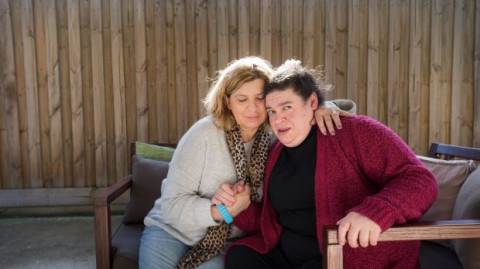
When Jessica Eshel heard a new national disability scheme was coming, she vowed to advocate on behalf of her sister Antonella, 41, who has an intellectual and other complex disabilities.
She pored over NDIS brochures, went to information sessions and spoke to the carers at Antonella's group home about the kind of support she needed to live a full, happy life.
So she was shocked when, after a brief conversation with an NDIS planner on the phone, Antonella's finished plan arrived in the letterbox. No meeting, no consultation.
"It's so basic, it's like a five-year-old wrote it," she says. "My sister is complex needs, she needs a high level of support."
Not only was there no chance to raise the problem of Antonella's worsening mental health, but she was financially worse off. Because she went onto the NDIS her mobility allowance from Centrelink was cut, leaving her $90 a fortnight out of pocket.
Other Victorians with severe disabilities have been left financially worse off after joining the NDIS, and given no meaningful opportunity to shape their new care plans.
Disability advocates – who all emphasised their strong support for the NDIS – said the agency managing the scheme was under enormous pressure to sign up participants in an unrealistic timeframe, and with inadequate federal funding.
As a result, plans for Victorians with complex disabilities are being drawn up by planners with insufficient expertise, they say. Planners are also doing plans over the phone rather than face-to-face, placing many people with a disability at a disadvantage.
Families are working in good faith to understand the new scheme but the quality of information and implementation has varied wildly, Kevin Stone, from VALID, an organisation for adults with intellectual disabilities, says.
"It's their way of trying to get people in as quickly as possible, we get that," Stone says. "But that sometimes results in cutting corners. There should be more bums on seats, more planners to keep up with the pace.
"We're not blaming anybody, or being political about it, just saying that here is a group of people that are not being served well."
VALID has appealed to Victoria's Disability Minister, Martin Foley, who agreed a group of experienced health and disability planners from the state government be seconded to the national agency to speed up the process.
Mr Foley accused the federal government of underfunding the scheme: "What we are facing at the moment is Canberra politicians and bean counters being in charge of choice and control at the expense of people with disability."
At the most recent meeting of the national Disability Reform Council (which oversees the NDIS), it was agreed there had been "significant issues" with the wider introduction of the scheme, particularly the "Myplace" online portal, which delayed payments to families.
"There was unanimous agreement the impact and scale of the recent issues was unacceptable for NDIS participants, their families and carers, and providers," a statement from the council said.
A spokeswoman for the National Disability Insurance Agency (which manages the scheme) said over the next three years 430,000 Australians will enter the NDIS.
People will be able to apply for the same supports and services regardless of whether their planning conversations were on the phone or in person, she said. If people are not able to do their plan over the phone, the agency would make alternative arrangements, she said.
A spokesperson for the Minister for Social Services, Christian Porter, said there had been no cuts or reductions to funding, and the Commonwealth had provided an extra 200 people after the bungles over the "Myplace" portal.
Jessica Eshel has refused to sign her sister's plan and appealed it, but does not expect a resolution for weeks. In the meantime, her sister has to pay for the taxis that take her to her regular day placement.
"It's the disabled people without parents or anyone to be their advocate I really worry for."